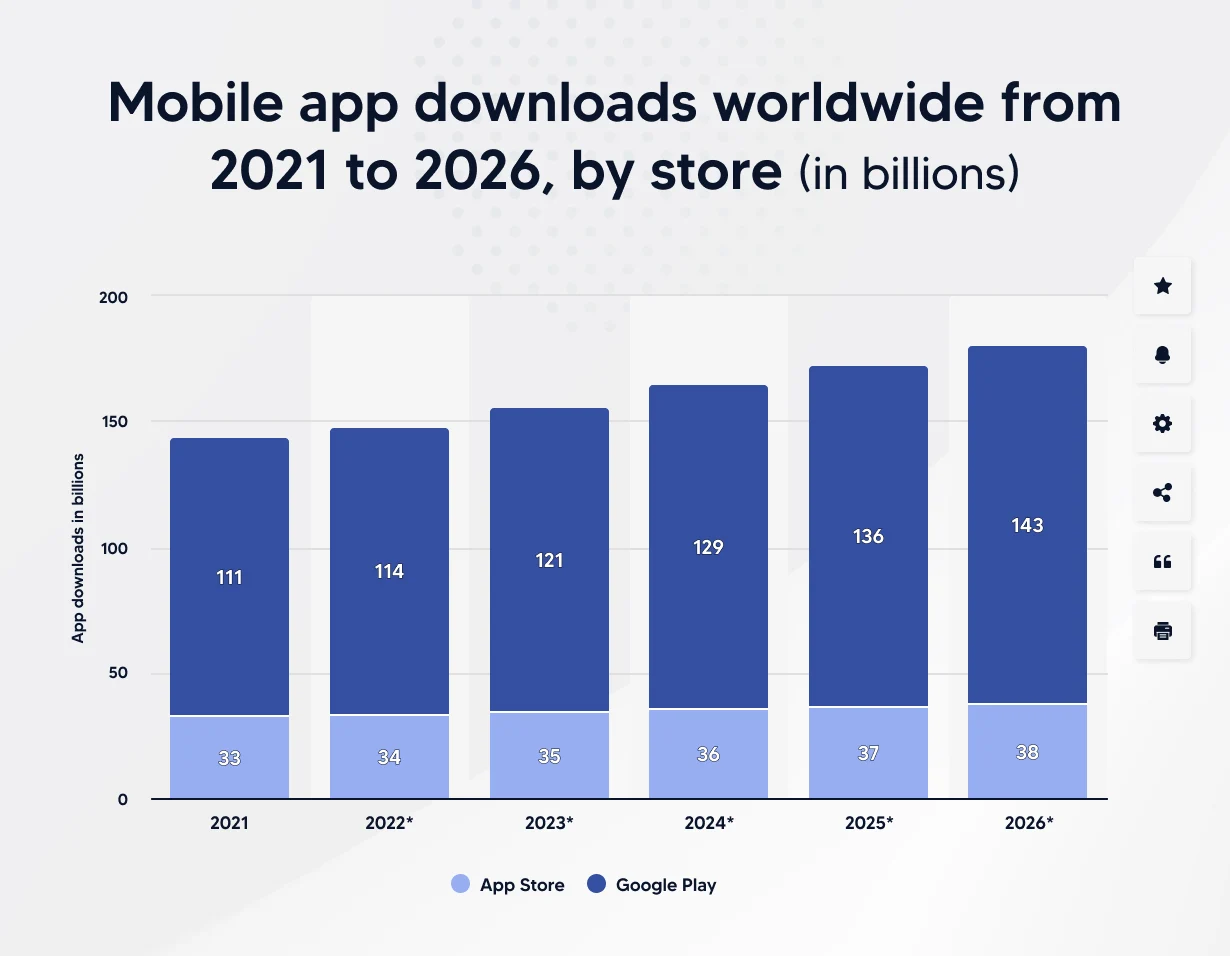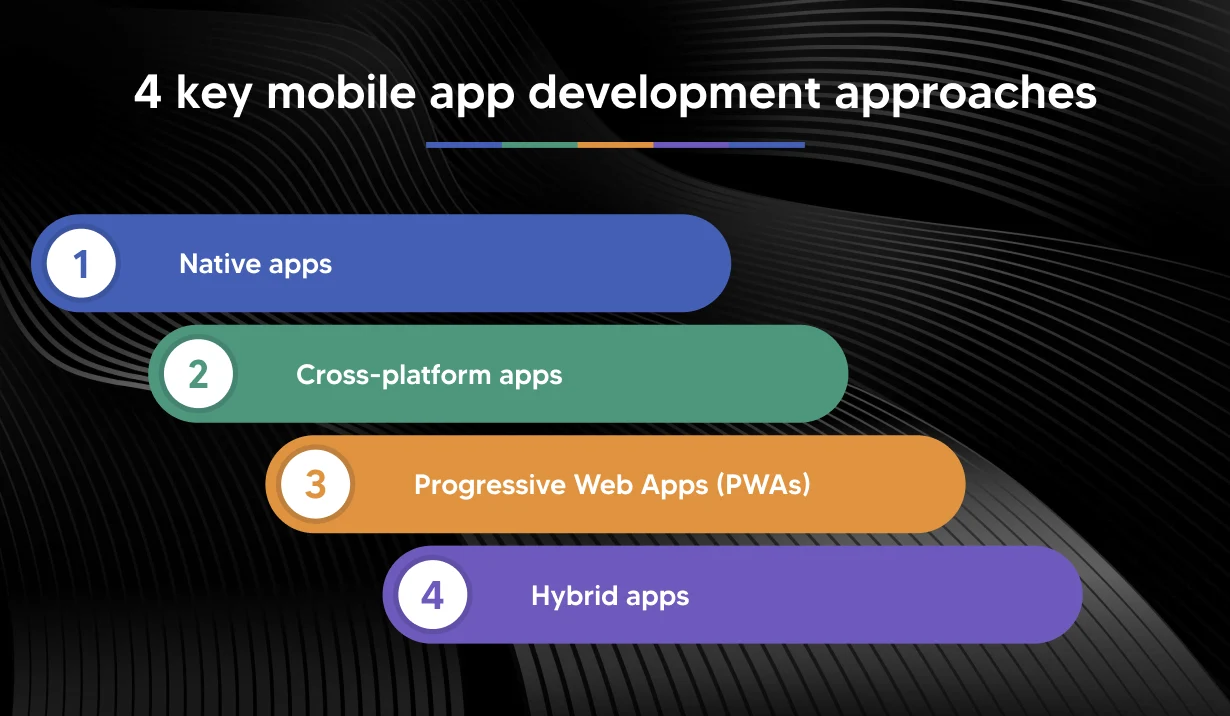Software Development
Programming
Mobile App Development: An essential guide for business executives

Software Development
Programming

Who would have thought that one day, we’d have more mobile apps than human beings?
The numbers related to mobile app downloads available on Statista are hard to digest: It says by 2026, there will be 143 billion downloads on Google and 38 billion downloads on the Apple App Store!

According to Grand View Research, the global mobile application market was worth nearly USD 228.98 billion in 2023 and is expected to expand at a compound annual growth rate (CAGR) of 14.3% from 2024 to 2030.
The surge in mobile app popularity, driven by technological advancements such as more robust frameworks and low-code technologies, presents a golden opportunity for business executives.
This guide provides a comprehensive overview of mobile app development, offering insights into app development methodologies, key trends, and development costs to help you navigate the complexities of mobile app development and ensure that your app succeeds in today’s highly dynamic marketplace.
Mobile app development is simple. It is all the things you do to build an app that works across mobile devices. To get an app up and running, you first think of an idea that can be turned into an app. Then, stages like design, development, testing, and deployment can come.
Today, developers use different sets of programming languages, frameworks, APIs, and storage and security infrastructure to develop mobile applications.
Different development methodologies exist, such as Agile, DevOps, and DevSecOps. Numerous programming languages and frameworks, such as Python, R, JavaScript, Swift, Kotlin, React Native, Flutter, etc., can be used to plan and accelerate the app development project.
At the end of the day, the sole objective of an app development process is to ship highly intuitive and secure applications that can help accelerate customer experience while enabling the business to achieve its desired goals.
In the last decade, there has been quite a dramatic surge in the demand for intelligent applications to drive customer engagement and business outcomes. We now have a wealth of tools and platforms to help us from the conceptualization stage to when we finally deploy the app to a chosen environment and publish it for the users.

Native apps are built for specific devices and operating systems such as Android and iOS. Native app developers write these apps using the programming languages and frameworks the platform owner provides. So, the development team will use Java and Kotlin if it is an Android-based application. For iOS, the preferred languages are Objective C and Swift.
Although Native app development offers a long list of benefits, the most outstanding advantage is that native apps are compatible with the hardware and software of the devices they run on. This leads to superior app performance and customer experience.
Cross-platform mobile applications, or multi-platform applications, are software applications built to run across several operating systems using a single codebase. Mobile app development companies can use this development approach to accelerate development and time to market while also successfully lowering development costs and reaching a wider audience.
Cross-platform mobile applications can be built using diverse programming languages and frameworks like Java, JavaScript, Python, React Native, and Flutter. Read more about cross-platform apps here.
Progressive web apps (PWAs) represent another mobile development approach in which the development team combines the best of mobile and web and paves the way for a new breed of software applications.
Progressive web apps are built using web technologies such as HTML, CSS, and JavaScript and are designed to unleash a native-like experience. PWAs are accessible through web browsers or downloaded from an app store.
Another development approach for building mobile apps is hybrid apps. These applications are web apps with a native app shell that connects to a mobile platform's capabilities through an embedded browser.
Hybrid app development can be considered for building apps that are usable offline, take advantage of device capabilities, or run across platforms such as Android and iOS. Hybrid apps are built with HTML, CSS, and JavaScript web technologies.
Each mobile app development methodology presents its challenges and opportunities. For a start-up, a cross-platform approach might be more appropriate, while for another, native development might be the best route to capture a business opportunity.
Creating a software application first requires a clear strategy. The journey often starts with an app idea.
You research the market for similar products, write down all the required features and functionalities the app must have, and write down about the target market. You discuss the idea with the team and key stakeholders such as senior leadership, customer groups, etc. You pitch the idea and aim for early shareholder buy-ins for reduced friction.
Once the basics are sorted, you must tackle the other vital things. Answering the following questions can further help you build an app at the desired pace without overspending.
What is the purpose of the software application?
Who is the target audience?
What is the maximum budget for the project?
What are the timelines?
What platforms (such as Android and iOS) and devices will the app support?
What features and functionalities are needed?
How will the app handle user data and privacy?
What technology stack will be used?
How will the App be Tested and Validated?
Confronting these questions honestly will help streamline and accelerate the app development process and meet the ever-increasing customer expectations.
Hiring a long-established mobile app development company with a proven track record, such as Kellton, can allow you to offload much of the app development work and focus more on achieving core milestones.
We can help you launch fast, scale smart, and sell nonstop.

Check back later — new content will appear here once published.